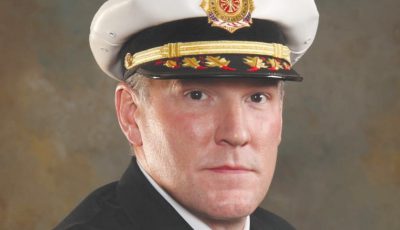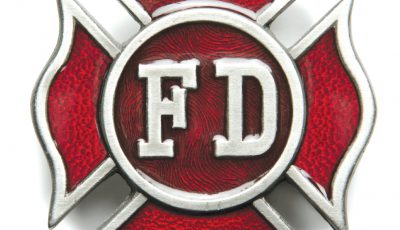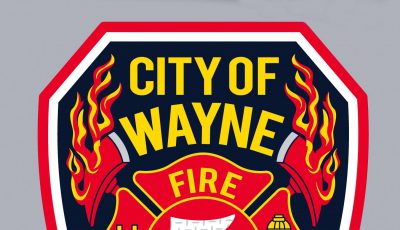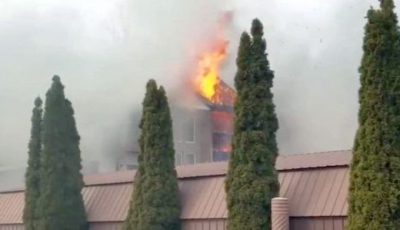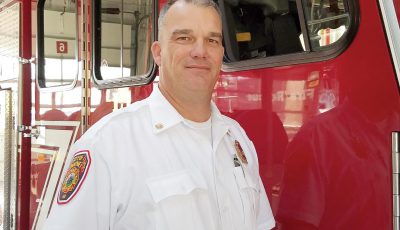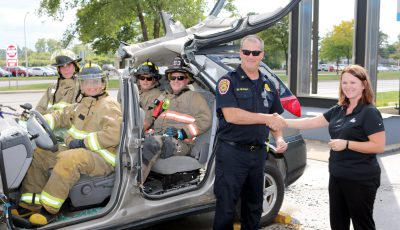The Teachings of a Trailblazer
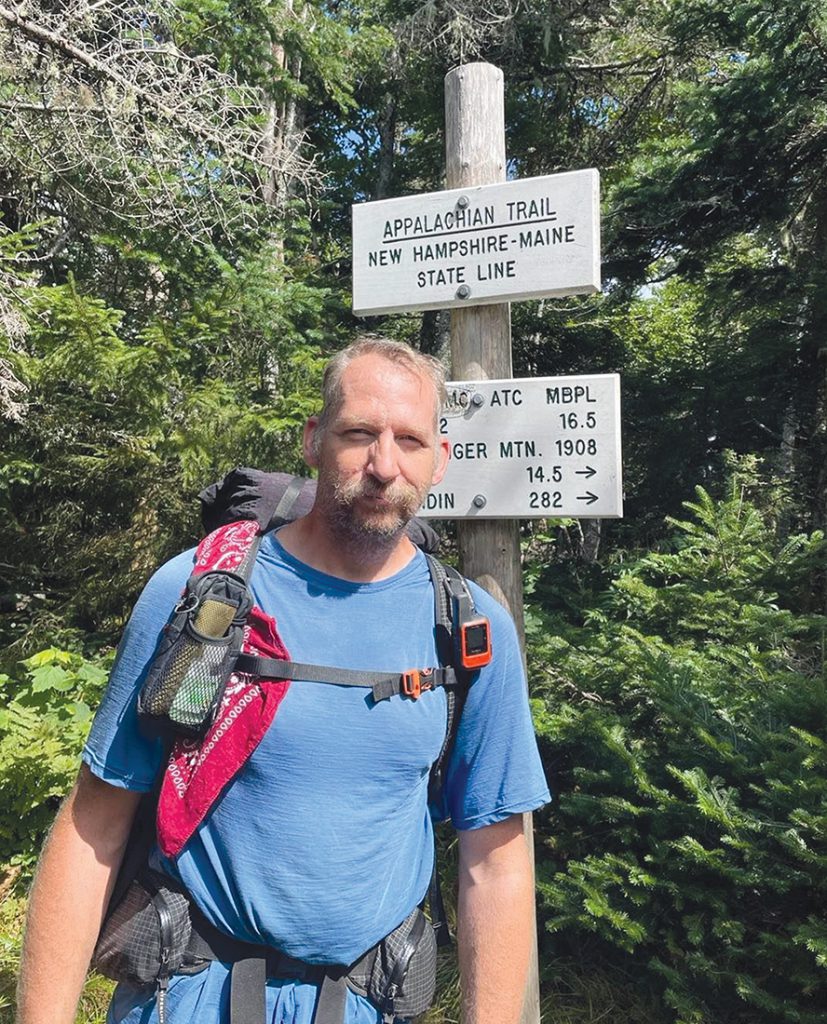
Dave Wylie on the Appalachian Trail.
By Courtney Conover – The numbers don’t lie.
Combine 2,194.2 miles, six months, five pairs of boots, two backpacks, and you’ll get a small yet intriguing summary of a rather unconventional experience.
It’s estimated that more than three million people hike segments of the Appalachian Trail each year—and Dave Wylie, a resident of Wayne for 12 years, is one of them.
Wylie is known as Firewalker, a moniker given to him by a hiker he met while hiking through Great Smoky Mountain National Park. And it’s not hard to figure out why: The nickname encompasses two essential components of his identity.
Clearly, Wylie is an avid walker. But there’s more to his story.
Wylie, who grew up in Allen Park and attended high school in Melvindale, entered the Marine Corps following his high school graduation, and it was during those four years of service that Wylie had an epiphany: He wanted to become a firefighter.
“So, after the Marine Corps, I went to Henry Ford Community College and got my associate degree in fire science,” says Wylie, 55. “I worked for the City of Taylor part-time for about two years and as a full-time EMT at Taylor Ambulance in Detroit for about two years. Then I got hired into the City of Wayne in 1995 as a firefighter and paramedic.”
While Wylie retired from the Wayne Fire Department in December of 2021, his most memorable days on the hiking trail lay ahead.
Here, Wylie shares with The Wayne Dispatch his incredible journey up the Appalachian Trail, a hiking trail in the Eastern United States which extends almost 2,200 miles (3,540 km) between Springer Mountain in Georgia and Mount Katahdin in Maine. The trail, which is heavily comprised of tree roots, rocks, and boulders, winds its way through a whopping 14 states and, according to the Appalachian Trail Conservancy, is the longest hiking-only trail in the world.
Courtney Conover: Thank you for your time today. It’s not every day that I talk to someone who has accomplished what you did—which is pretty stunning. Tell me about Young Dave so that readers get a greater understanding of how you got here. Were there clues in your childhood that you would one day end up where you are now?
Dave Wylie: Young Dave was driven. I had a roadmap of where I wanted to go, and being a Marine, a firefighter, and hiking the Appalachian Trail were on that roadmap. I spent a lot of time outdoors. Growing up, my dad worked for General Motors, and during the time when GM was doing the model changes of the cars—in July—we would go up to Northern Michigan. Every summer was spent there, fishing, hiking, and camping. That’s just what my family did. And I read a book when I was young about a kid thru-hiking on the long trails—the Pacific Crest Trail. And after I read that book, I was like, I wanna do this!
CC: How soon after did you set off on a trail?
DW: When I was a young teen, I went on a family trip to the east coast—I don’t remember what year it was—and I got to hike half a mile of the Appalachian Trail with my family. My parents knew I was interested in hiking the long trails. So, when we went to the Smoky Mountains, we went to it.
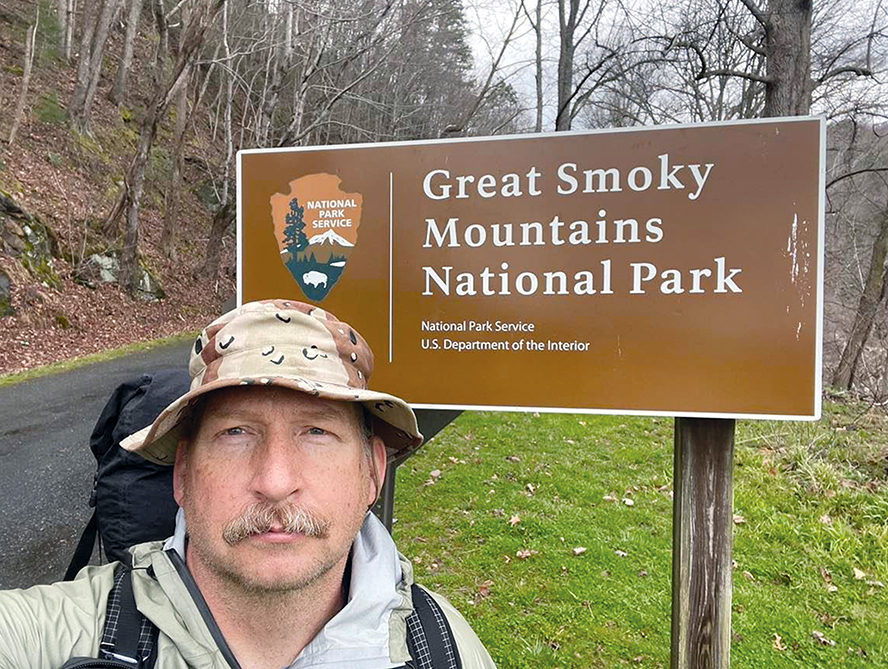
Dave Wylie at the Smoky Mountains National Park, in North Carolina at mile 167 on March 18, 2022.
CC: Let’s fast-forward to your most recent hike. In all, how many total miles did you hike, and what was the duration of your entire trip?
DW: I started February 25, 2022, and I ended my hike September 9, 2022. The trail starts down in Georgia, and it ends in Maine. Every year, the trail changes. When I hiked it in 2022, the trail was 2,194.2 miles. But I hiked a lot more miles—over 2,200 miles. Because when you hike, you hike for somewhere between five to seven days. And then you have to come off the trail, which might be anywhere from one mile to 10 miles, to go into town to get food. And then once you’re in town, you have to hike back to the trailhead [the entry point of the trail from a road or parking lot] to start your journey again.
CC: Where did the spark come from to even attempt this in the first place? When did you decide that you’d go for it?
DW: I decided to go hiking during my vacation in 2017, and I wanted to get the biggest bang for my buck. I spent a lot of time researching the Appalachian Trail, and decided I’d hike the northern part. I ended up hiking about 500 miles of the trail. That’s when I fell in love. I had talked to a lot of hikers, and I’d heard the stories. And I knew exactly what I was going to do when I retired: I wanted to hike the entire trail. And my experience in 2017 taught me that I could actually do it.
CC: It’s funny, I envision you trekking through this tranquil, quiet trail all alone, but you were among other hikers. Tell me about the hikers you encountered in 2022.
DW: There are people who have traveled from other continents and other countries. I had spoken to people from Australia, the UK, Canada, Germany, and Spain. The year 2022 was the busiest year due to the travel ban being lifted—the borders had been closed previously because of COVID.
CC: Tell me about your gear, which had to be meticulously considered, because everything has to remain on you—it’s not like you could schlep a set of luggage along the trail.
DW: In 2022, I went through five pairs of boots. There was a time in Maine when I had to use medical tape to wrap my toe up because the sole near my toe was split apart. There’s “The Big Three” in backpacking: your sleeping bag, your backpack, and your tent, which is your shelter. I spent a lot of money on those three things and, combined, they weighed about five pounds. And, I had two different sleeping bags—one for winter and one for summer.
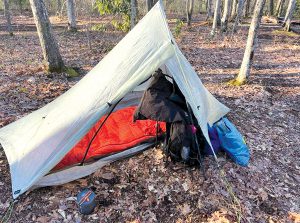
Hampton morning.
CC: What was the most difficult thing about this journey?
DW: You start missing people. I missed my girlfriend, my family, my dog. I missed my friends and the fire service. I missed Michigan, I missed Wayne. I was gone for six and a half months. I have a cell phone—and there were areas where I did have cell service—but there are a lot of places where you don’t have that. And on those days, I didn’t talk to anyone except the other hikers. I met a lot of new friends that way. I still talk to them.
CC: Let’s talk about the cost of all this?
DW: It was expensive! There are a lot of hidden costs—the backpacking meals, the energy bars. My girlfriend would buy those in bulk from Amazon, and then she would divvy them up and mail them to me on the trail. [There are post offices in the trail towns along the Appalachian corridor where hikers can pick up packages that have been sent to them.] This is essential because the places that sell food along the trail markup the prices. So, even when the weather was bad, I had to hike to stay on schedule to receive my food. Otherwise, I’d starve. I ate breakfast, a second breakfast, lunch, an afternoon snack, and dinner. The thing is you can’t haul enough food to maintain your calories. I

Wylie reaches the top of mount Katahdin in Maine.
actually got sick a couple times because I wasn’t eating enough food. Carrying food is heavy, and you need to keep your weight around (for me) 26 pounds, and it can be up to 30 pounds with food.
CC: What is some invaluable advice about pitching a tent successfully?
DW: Get into camp before sundown because when it gets dark, it’s dark. You don’t want to set your tent up under a dead tree or branch; and you don’t want to set your tent up on a root or rock; and you don’t want to set your tent up in a valley where, if it rains in the middle of the night, water is going to run down the mountain and into your tent.
CC: Wow! All stellar advice. You had to have a lot of trust to complete this journey.
DW: There’s a saying among us hikers: “The trail will provide.” And most of the time, the trail does provide. There are a ton of volunteers that maintain the trail, and there is what we call “trail magic,” when people show up in their cars and make breakfast for hikers, or hot dogs and hamburgers. There’s basically a party in the woods for hikers. It’s incredible that so many people are willing to help out. It’s incredible to see that kind of love and care from complete strangers.
CC: Alright. Final question: What are you most grateful for?
DW: My girlfriend, Amy Hodge, was my lifeline. She drove me to Georgia [where the Appalachian Trail begins] and picked me up in Maine [where the trail ends]. I couldn’t have done this without her.


